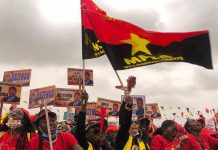Africa-Press – Angola. The existence of an attempt to inflect the world to the right is perceptible, by powerful ultraconservative forces grouped around apparently disparate principles, which in reality are not – from racist and white supremacist revivalism to the technocommunication revolution and financial capitalism – , the very clear victory of the center-left in Portugal, last Sunday, is a demonstration that it is possible to face and overcome the extremist and fundamentalist spectrum, erroneously called “populism”, of the ultra-billion forces that are behind bannons, trumps, bolsonaros , lepens and venturas, posing as entrepreneurs and innovators.
Local commentators, most of whom during the campaign seemed to be scandalously rooting for the success of any conservative political alliance that would incorporate this new right (rather than the traditional center-right that has historically shared power with the Socialist Party), have already recognized it: the Portuguese decided to vote massively for the socialists, demonstrating that they did not agree with this eventual wide alliance of the right, which would place the extreme right at the center of power.
PSD leader Rui Rio, the main loser on Sunday night, made a very correct political reading: the useful vote of the left was all placed in the PS basket, thus nullifying the real growth of the main opposition party. The main losers, perhaps more than the PSD itself, were, therefore, the parties to the left of the PS, specifically, the Bloco de Esquerda and the Portuguese Communist Party. As for Livre, I still haven’t figured out if it’s actually on the left of the PS.
The BE, at least, hastened to focus the analysis on the growth of the extreme right, going so far as to accuse the PS of having been responsible for the exponential growth of its bench.
Personally, I disagree with this analysis. It should not be forgotten that, in terms of the number of votes, the far-right leader performed much better in the last presidential elections than his organization in the legislative ones held two days ago.
Another fact not to be forgotten: the spectacular implosion of the CDS. It would not be foolish, therefore, to assume that a part of the votes of the extreme right came from the CDS (in some regions, it will also have come from the PCP itself, which is only strange for those who ignore electoral sociology).
Be that as it may, I would add that, in my opinion, and despite the impact caused by the growth of the far-right bench, it should have the same fate as similar organizations in other European countries: despite all the “throat”, it will wither with time.
The PCP and BE, in particular, whether they recognize it or not, will have to do, to paraphrase the great Angolan writer Pepetela, a “sincere self-criticism” (according to him, “Lenin’s best invention”).
The facts have shown that, when they hurriedly buried the “gengonça” at the end of last year, they committed a fatal miscalculation. In my opinion as a foreign observer, it is not enough for the PCP, for example, to display the flag of its 100 years of history ; it needs to think about re-founding itself.
As for the BE, what happened to it (including the post-electoral statements made by some of its main figures) demonstrates the difficulty of middle-class “revolutionaries” to divest themselves of their avant-garde temptation and manager.
Social transformations in general cannot be imposed from above. On the other hand, there is no direct relationship between social class and progressive consciousness (if there were, how to understand the far-right vote among some poorer voters?). It is best to adopt the Bakongo saying: malembe-malembe (“slowly and well”). But BE doesn’t know kikongo (the language of the Bakongo)
For More News And Analysis About Angola Follow Africa-Press






